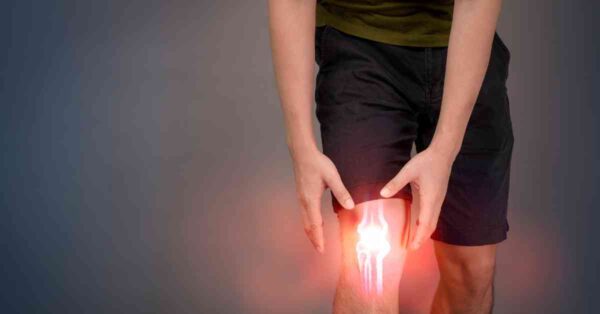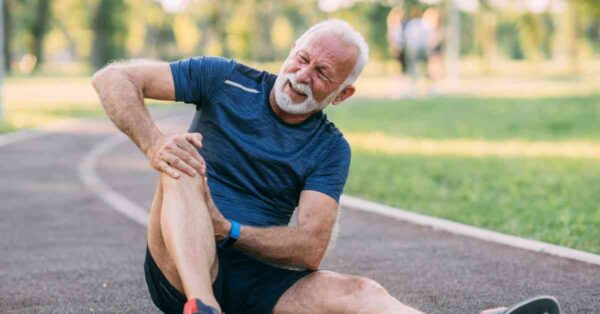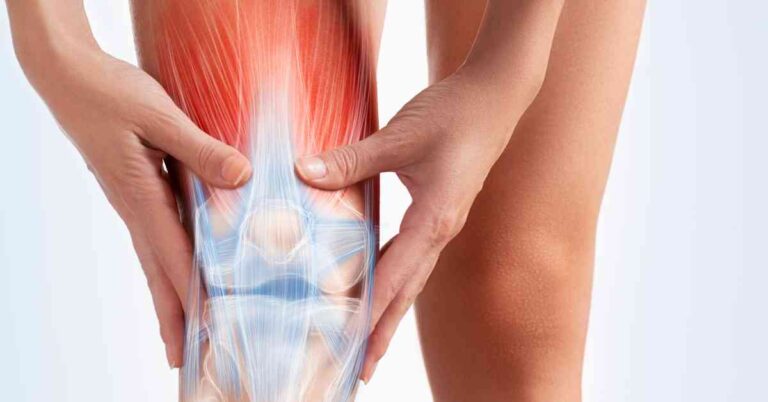Cracking knees can be an annoying and sometimes painful experience. But did you know that specific vitamins can help alleviate the issue? This easy-to-read article will explore the causes of cracking knees, which vitamins for cracking knees are proven to help, and how they work. We’ll also provide a list of food and supplements to support joint health and share when it’s time to consult a doctor.
Causes of Cracking Knees
It is important to note that knee cracking isn’t always a sign of something serious- unless it’s overly frequent and causes pain, discomfort, or interferes with daily activities.
Cracking knees, or crepitus, can occur for a variety of reasons.
Some common causes include:
- Gas bubbles: Gas bubbles forming and bursting in the synovial fluid can cause cracking sounds.
- Ligament or tendon movement: Ligaments and tendons may make noises when they slide over the joint surface.
- Cartilage wear: Worn or damaged cartilage can lead to friction and cracking noises.
- Meniscal tear: A cartilage (meniscus) tear that cushions the knee joint can cause a clicking or cracking sound during movement.
- Patellofemoral pain syndrome: The runner’s knee occurs when the kneecap (patella) does not move smoothly over the femur, leading to knee cracking or popping.
- Loose bodies: Sometimes, fragments of bone or cartilage can break off and float within the joint, causing a cracking or clicking sound when the knee moves.
- Iliotibial (IT) band syndrome: The IT band is the connective tissue that runs along the hip to the shin. Tightness or inflammation of the IT band can cause snapping or cracking sounds around the knee joint.
- Bursitis: Inflammation of the tiny fluid-filled sacs (bursae) cushioning the knee joint can lead to cracking and discomfort.
- Osteoarthritis: This degenerative joint disease causes the cartilage to wear down over time, leading to bone-on-bone contact and cracking or grinding sounds.
- Rheumatoid arthritis: An autoimmune disorder that causes inflammation in the joints, rheumatoid arthritis can lead to knee cracking and discomfort.
- Patellar subluxation occurs when the kneecap moves partially out of its proper alignment, causing a cracking or popping sound during movement.
- Joint hypermobility: Some individuals have more flexible joints than average, leading to joint instability and cracking sounds.
- Previous injury: A history of knee injuries, such as ligament or cartilage damage, can cause knee cracking due to altered joint mechanics or scar tissue formation.
Vitamins Proven to Help Cracking Knees

- Vitamin D: This essential Vitamin helps maintain healthy bones and joints by promoting calcium absorption. Low vitamin D levels may cause joint pain and stiffness, making it crucial for those with cracking knees. Fatty fish (salmon, mackerel), fortified dairy products, and egg yolks are high in Vitamin D.
- Vitamin C: A powerful antioxidant, vitamin C supports collagen production, essential for healthy connective tissues, including tendons and ligaments. It also helps reduce inflammation, which can contribute to joint discomfort. Foods high in Vitamin include Citrus fruits, strawberries, bell peppers, and broccoli.
- Vitamin E: Another potent antioxidant, vitamin E fights inflammation and supports joint health by protecting cells from oxidative stress. Foods high in Vitamin E include nuts, seeds, vegetable oils, and leafy greens.
- Vitamin K: Vital for bone health; vitamin K promotes calcium regulation and helps maintain strong cartilage. Try eating Green leafy vegetables, broccoli, and Brussels sprouts to get Vitamin K.
- Vitamin B3 (Niacin): This B vitamin has anti-inflammatory properties and may help improve joint mobility. Foods rich in niacin include chicken, turkey, tuna, and whole grains.
- Vitamin B6 (Pyridoxine): Vitamin B6 plays a role in managing inflammation, making it beneficial for joint health. Good sources of this Vitamin include poultry, fish, potatoes, and bananas.
- Vitamin B12 (Cobalamin): Essential for nerve function and blood cell formation, vitamin B12 can help reduce joint pain associated with cracking knees. Animal-based foods like fish, meat, and dairy are rich in vitamin B12.
- Calcium: Crucial for bone health, calcium works alongside vitamin D to maintain strong and healthy joints. Dairy products, leafy greens, and fortified plant-based milk are good sources of calcium.
- Magnesium: This mineral supports bone health and muscle function, which can help alleviate cracking knees. Magnesium-rich foods include dark chocolate, avocados, nuts, and whole grains.
- Selenium: As an antioxidant, Selenium can help reduce inflammation and protect joint tissues. You can find Selenium in nuts, fish, and whole grains.
- Zinc: Zinc is involved in collagen synthesis and has anti-inflammatory properties, making it essential for joint health. Foods high in zinc include red meat, poultry, and legumes.
High-Rated Vitamin and Supplement Products
- Glucosamine and Chondroitin: These two compounds are commonly used in joint supplements, as they promote cartilage repair and reduce joint inflammation. A reputable brand to consider is Schiff’s Move Free Advanced Plus MSM.
- Omega-3 Fatty Acids: Fish oil supplements containing omega-3 fatty acids, particularly EPA and DHA, are known for their anti-inflammatory properties, which may help alleviate cracking knees. Nordic Naturals Ultimate Omega is a well-regarded product in this category.
- Turmeric (Curcumin): Curcumin, the active ingredient in turmeric, has potent anti-inflammatory and antioxidant properties. Look for highly bioavailable supplements, such as black pepper extract or patented formulations like BCM-95 or CurcuWIN. A reputable brand to consider is Nature’s Nutrition Turmeric Curcumin with BioPerine.
- Collagen: Collagen supplements may help improve joint health and flexibility by supporting the connective tissues within joints. Vital Proteins Collagen Peptides and NeoCell Super Collagen are two popular options.
- MSM (Methylsulfonylmethane): MSM is a natural, anti-inflammatory compound that can help improve joint flexibility. A reputable brand in this category is NOW Foods MSM.
- Multivitamins: A great way to ensure you get all the essential vitamins and minerals for optimal joint health. Some popular options include Centrum Silver, One A Day Men’s/Women’s, and Rainbow Light Men’s/Women’s One. Take multivitamins with food; otherwise, they can cause an upset stomach
Other Tips for Alleviating Cracking Knees
- Maintaining a healthy weight: Excess weight puts additional stress on your joints, increasing the risk of knee cracking.
- Exercise regularly: Low-impact activities like swimming, cycling, and yoga can help strengthen muscles and improve joint flexibility.
- Stay hydrated: Drinking plenty of water supports joint health by keeping the synovial fluid well-lubricated.
- Warm compresses: Applying a warm compress or heating pad to the affected knee can help relieve stiffness and discomfort by improving blood flow to the joint.
- Cold therapy: Applying ice packs wrapped in a towel to the knee for 15-20 minutes can help reduce inflammation and alleviate pain.
- Epsom salt baths: Soaking in a warm/hot bath with Epsom salts can help soothe aching joints and relax the surrounding muscles. The magnesium in Epsom salts is known to have anti-inflammatory effects.
- Stretching exercises: Regularly performing knee stretches can help improve joint flexibility and reduce stiffness. Gently stretch your quadriceps, hamstrings, and calf muscles.
- Strengthening exercises: Strengthening the knee muscles, such as the quadriceps and hamstrings, can provide better support to the joint and alleviate cracking. Consult a physical therapist or personal trainer for exercises tailored to your needs.
- Foam rolling: Using a foam roller to massage the muscles around the knee can help release tension, improve flexibility, and reduce joint discomfort.
- Proper footwear: Wearing shoes with good arch support and cushioning can help alleviate knee stress and reduce cracking.
- Massage therapy: Regular massages can help relax the muscles around the knee joint and improve blood flow, potentially reducing joint discomfort.
- Avoid high-impact activities: Swap high-impact exercises like running or jumping for low-impact alternatives such as swimming, cycling, or walking.
- Maintain good posture: Proper body alignment while standing and sitting can help reduce strain on the knee joint.
- Alternative therapies: Some people find relief from knee discomfort through alternative therapies such as acupuncture or chiropractic treatments.
When to See a Doctor

Remember, cracking knees aren’t always a cause for concern; however, you should consult a healthcare professional if you experience:
- Persistent or worsening knee pain
- Swelling or redness around the joint
- Reduced range of motion
- Signs of infection
A healthcare professional will use a combination of techniques and examinations to diagnose and treat cracking knees. They can determine if your symptoms are a cause for concern and implement the proper treatments.
Standard treatment options include:
- Rest: Taking a break from activities that exacerbate your symptoms can help reduce inflammation and promote healing.
- Ice and heat therapy: Applying ice packs or warm compresses to the affected knee can help alleviate pain and inflammation.
- Medications: Over-the-counter pain relievers and anti-inflammatory drugs, like ibuprofen or naproxen, can help reduce discomfort and inflammation. Sometimes, the doctor may prescribe stronger pain medications, corticosteroid injections, or hyaluronic acid injections.
- Physical therapy: A physical therapist can help develop a personalized exercise program to strengthen the muscles around the knee joint, improve flexibility, and address biomechanical problems contributing to knee cracking.
- Bracing or taping: Sometimes, the doctor may recommend a knee brace, support, or kinesiology tape to provide stability and reduce pain.
- Surgery: If conservative treatments don’t provide sufficient relief or the underlying issue is severe (e.g., a meniscal tear or advanced osteoarthritis), the doctor may recommend surgery, such as arthroscopy, cartilage repair, or joint replacement.
In Conclusion
Remember to maintain a healthy lifestyle with regular exercise and hydration. Cracking knees can be a bothersome issue, but incorporating the right vitamins, foods, and supplements into your daily routine can make a significant difference. Don’t hesitate to consult a doctor if you have concerns about your knee health.
Find more stories on the blog.
References:
- National Institute of Arthritis and Musculoskeletal and Skin Diseases. (2017). Joint Cracking and Popping: Understanding noises that accompany joint pain. Retrieved from https://www.niams.nih.gov/health-topics/kids/healthy-joints/advanced#tab-overview
- Lin, J., Zhang, W., Jones, A., & Doherty, M. (2004). Efficacy of topical non-steroidal anti-inflammatory drugs in the treatment of osteoarthritis: meta-analysis of randomised controlled trials. BMJ, 329(7461), 324. https://doi.org/10.1136/bmj.38159.639028.7C Retrieved from https://www.ncbi.nlm.nih.gov/pmc/articles/PMC509052/
- National Institutes of Health Office of Dietary Supplements. (2021). Vitamin D. Retrieved from https://ods.od.nih.gov/factsheets/VitaminD-HealthProfessional/
- National Institutes of Health Office of Dietary Supplements. (2021). Vitamin C. Retrieved from https://ods.od.nih.gov/factsheets/VitaminC-HealthProfessional/
- National Institutes of Health Office of Dietary Supplements. (2021). Vitamin E. Retrieved from https://ods.od.nih.gov/factsheets/VitaminE-HealthProfessional/
- National Institutes of Health Office of Dietary Supplements. (2021). Vitamin K. Retrieved from https://ods.od.nih.gov/factsheets/VitaminK-HealthProfessional/
- U.S. National Library of Medicine. (2021). Meniscal tears. Retrieved from https://medlineplus.gov/ency/article/001071.htm
- Tashiro, A., Okamoto, Y., Chang, H., & Chung, U. (2012). Oral administration of polymer hyaluronic acid alleviates symptoms of knee osteoarthritis: a double-blind, placebo-controlled study over a 12-month period. The Scientific World Journal, 2012, 167928. https://doi.org/10.1100/2012/167928 Retrieved from https://www.ncbi.nlm.nih.gov/pmc/articles/PMC3506935/




